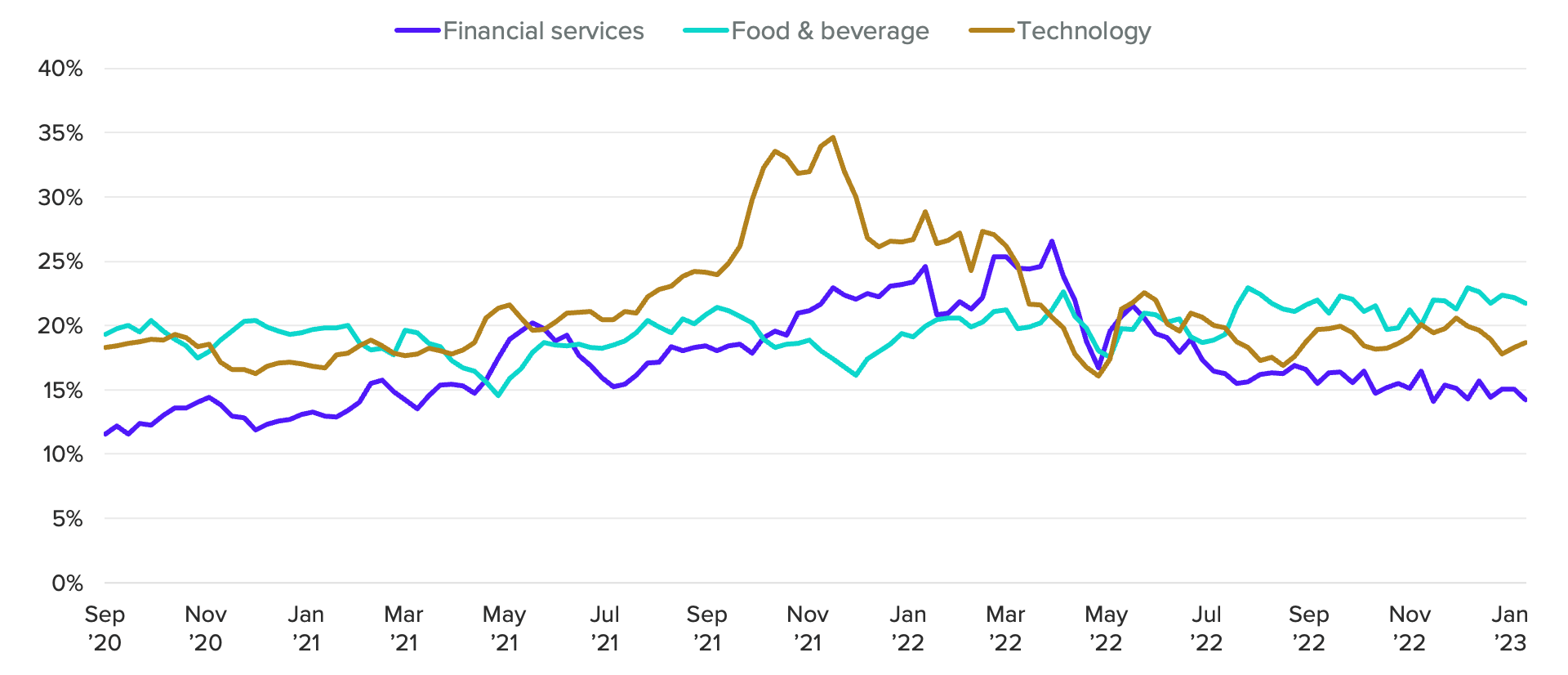2023 Will Test Labor Market’s Resilience (Report Preview)

Key Takeaways
The U.S. labor market is still humming along, and most U.S. workers are not feeling the sting of income losses. Morning Consult’s Lost Pay and Income tracker fell to 10.3% in January, and is now just above series lows.
Employed U.S. adults are continuing to look for new positions, despite recession risks and news of layoffs, as the prospect of higher pay outweighs any desire for the improved job security of staying put.
Job insecurity rose among high-income workers in January as layoffs of professional, white-collar workers continue to make headlines. On the other hand, lower-income workers are feeling increasingly secure.
This memo offers a preview of Morning Consult’s February U.S. Jobs & Labor Report. Morning Consult Economic Intelligence subscribers can access the full report here.
The U.S. labor market is still humming along, boasting strong job growth and a decades-low unemployment rate. However, recession risks are growing as interest rate hikes over the course of 2022 begin to take their full effect and consumers start to pull back on spending. Consumers are increasingly struggling to navigate the ongoing effects from last year’s spike in prices by drawing on credit and savings, and Morning Consult’s proprietary data suggests that consumer spending weakened at the end of 2022. A further slowdown in consumer demand would likely be followed by a slowdown in business investment and hiring.
Continued elevated nominal wage growth would place pressure on the Federal Reserve to lift rates higher for longer. The prospect of higher wages continues to entice workers to look into making an employment change. As of Jan. 21, 18.4% of employed U.S. adults and 20.1% of prime-age employed U.S. adults said they were actively applying for new positions.
While job search activity remains elevated overall, the shares of workers in technology and finance who are actively applying has fallen considerably in recent months. Information and technology workers and financial services workers were also most likely to say they expected to experience a pay or income loss in the next four weeks.
Job Search Activity Among Tech and Finance Workers Has Cooled Considerably
(4-week moving average)

On the other hand, workers in industries like retail, where the job market remains hot, are still looking to make a move. As long as a tight labor market continues to fuel elevated job search activity and separations, upward pressure on wages will make the Fed’s mission of price stability especially challenging.
Jobs growth is likely to continue to slow over the next three months as the U.S. economy moves away from the vaccination recovery phase and companies increasingly come to terms with elevated interest rates and weaker consumer demand. In the near term, workers will continue to be reallocated from companies and sectors that overhired during the pandemic to those that still have job openings, limiting the risk of an outright jobs contraction for the next few months. Looking ahead, the range of employment scenarios diverges over the next three to six months, with the fate of the U.S. economy hanging in the balance.
About this report
Morning Consult’s monthly U.S. Jobs & Labor Report provides a detailed assessment of the current state of the U.S. labor market, featuring proprietary data that provides enhanced scale, frequency and depth to official data sets.
Businesses and investors rely on this report to identify emerging labor trends and better understand how to attract, hire and retain talent.
The report draws on Morning Consult Economic Intelligence, a high-frequency global economic data set reflecting more than 17,000 daily economic surveys across the 43 largest global economies.
Full methodology and average daily sample sizes per country can be found here.
John Leer leads Morning Consult’s global economic research, overseeing the company’s economic data collection, validation and analysis. He is an authority on the effects of consumer preferences, expectations and experiences on purchasing patterns, prices and employment.
John continues to advance scholarship in the field of economics, recently partnering with researchers at the Federal Reserve Bank of Cleveland to design a new approach to measuring consumers’ inflation expectations.
This novel approach, now known as the Indirect Consumer Inflation Expectations measure, leverages Morning Consult’s high-frequency survey data to capture unique insights into consumers’ expectations for future inflation.
Prior to Morning Consult, John worked for Promontory Financial Group, offering strategic solutions to financial services firms on matters including credit risk modeling and management, corporate governance, and compliance risk management.
He earned a bachelor’s degree in economics and philosophy with honors from Georgetown University and a master’s degree in economics and management studies (MEMS) from Humboldt University in Berlin.
His analysis has been cited in The New York Times, The Wall Street Journal, Reuters, The Washington Post, The Economist and more.
Follow him on Twitter @JohnCLeer. For speaking opportunities and booking requests, please email [email protected]
Jesse Wheeler previously worked at Morning Consult as a senior economist.